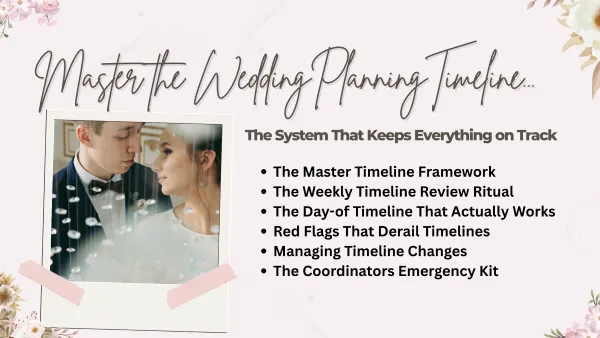
Master the Wedding Planning Timeline

Timeline coordination is the backbone of successful wedding planning – and the biggest source of stress for most planners. One missed deadline, one vendor running late, or one miscommunication can create a domino effect that impacts the entire wedding day.
Here's how to build a timeline coordination system that keeps you (and your clients) calm, confident, and on schedule.
The Master Timeline Framework
Stop creating timelines from scratch for every wedding. Build a master framework with these key phases:
18-Month Master Timeline:
12+ months: Venue, major vendors, save-the-dates
6-9 months: Invitations, menu planning, attire
3-4 months: Final details, RSVPs, seating charts
1 month: Final confirmations+ and day-of logistics
1-2 Weeks: Final touches and Timeline Review/Changes
Pro tip: Create different versions for different wedding sizes and complexity levels. A 50-person backyard wedding needs different timing than a 300-person formal affair.
The Three-Timeline System
Never rely on just one timeline. Use this three-pronged approach:
1. Client-Facing Timeline
Clean, simple milestones that don't overwhelm your clients:
"Book photographer by March 15th"
"Send invitations by June 1st"
"Final headcount due August 15th"
2. Vendor Coordination Timeline
Detailed schedules with specific deadlines for each vendor:
Florist needs final arrangements 2 weeks before
Caterer requires headcount 1 week before
DJ needs playlist 3 days before
3. Internal Operations Timeline
Your behind-the-scenes schedule:
Follow-up calls and emails
Contract reviews and payments
Site visits and vendor meetings
A Digital Tool that Actually Works for You
BrandWave for Timeline Management:
Built-in timeline features with client portals
Automation reminder emails and text messages to your client
Auto invoicing reminders when payments are due
Shared calendars with all vendors
Group messaging for real-time updates
The Weekly Timeline Review Ritual
Every Monday, spend 30 minutes reviewing:
What's due this week for each client
Which vendors need follow-up
Any timeline adjustments needed
Potential bottlenecks or conflicts
Set automated reminders for yourself 48 hours before any major deadline.
Managing Timeline Changes (Because They Will Happen!)
Build flexibility into your system:
Create Buffer Time:
Add 2-week buffers before major deadlines
Build in extra time for vendor responses
Plan for seasonal delays (holidays, weather)
Communication Protocol:
Immediate notification system for timeline changes
Clear escalation process for delays
Regular check-ins with clients and vendors
The Day-of Timeline That Actually Works
Your wedding day timeline should be:
Detailed but flexible: Include setup, ceremony, reception phases
Vendor-specific: Each vendor gets their relevant portions
Time-buffered: Build in 15-minute cushions between major events
Contact-heavy: Every vendor's contact info readily available
Red Flags That Derail Timelines
Watch for these timeline killers:
Clients who consistently miss deadlines
Vendors who don't respond within 48 hours
Last-minute guest list changes
Weather contingencies not planned
Transportation logistics overlooked
Timeline Coordination Emergency Kit
Always have ready:
Backup vendor contacts for every category (this is huge! Contact your backups and confirm their availability to be on a "on-call" list for that event. Ask them for an update if they become unavailable.)
Alternative timeline versions for common delays
Client communication templates for timeline changes
Day-of contact sheets for all key players
The Bottom Line: Timeline Mastery = Business Success
When you master timeline coordination, everything else falls into place. Your clients trust you more, vendors respect your professionalism, and you sleep better knowing everything is under control.
Start this week: Pick your most challenging upcoming wedding and rebuild its timeline using this system. Notice how much clearer and more manageable everything becomes when you have the right coordination framework in place.
